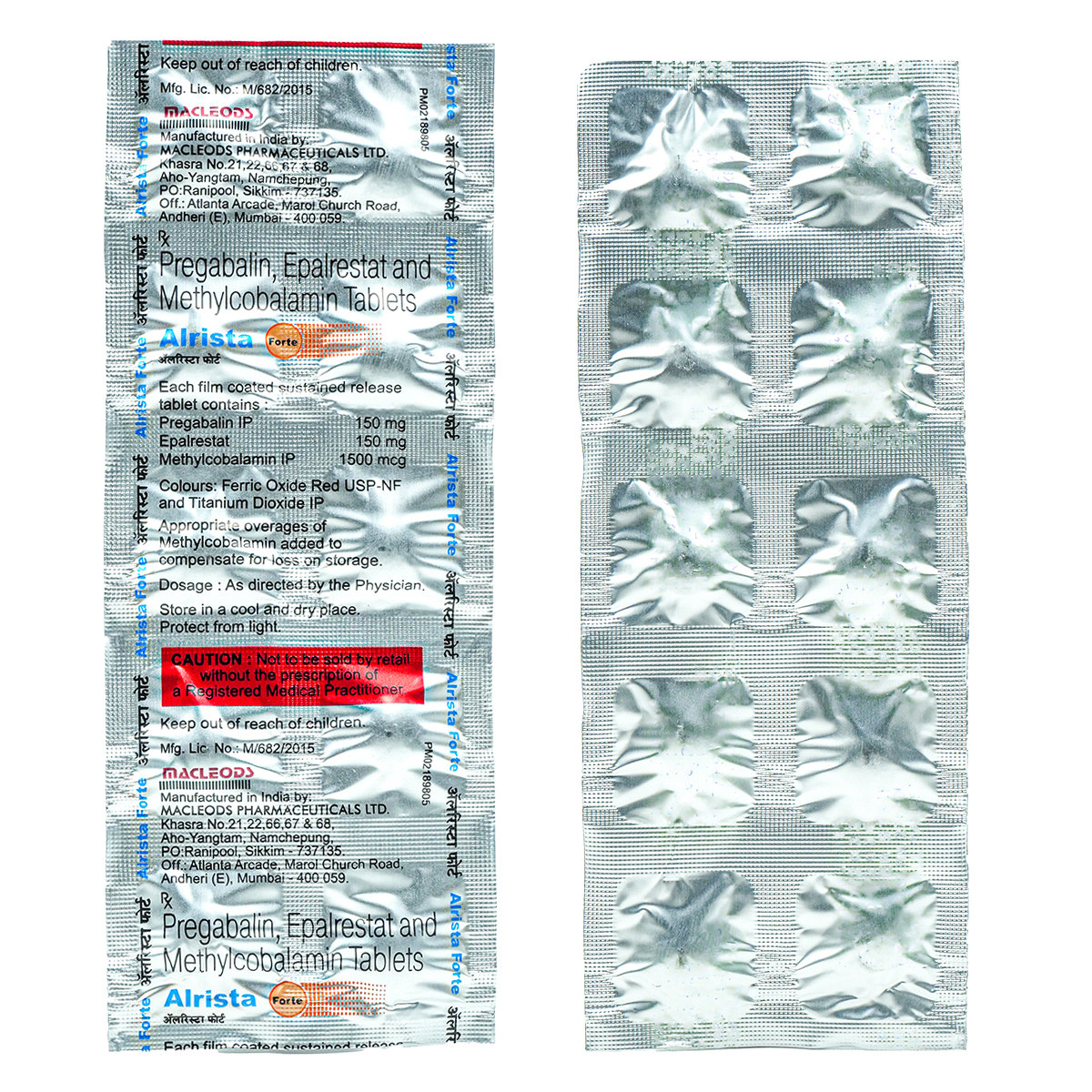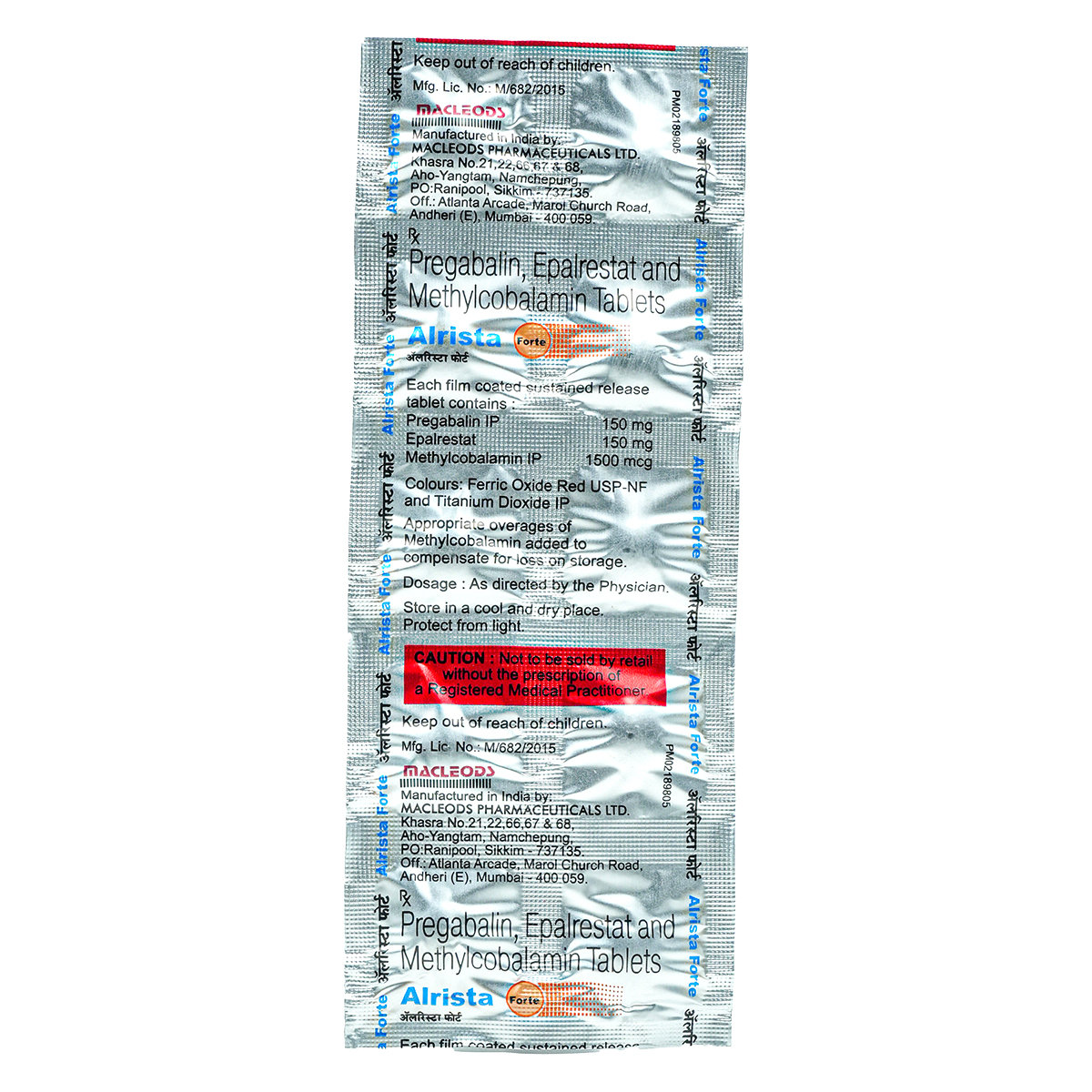Alrista Forte Tablet 10's
MRP ₹313
(Inclusive of all Taxes)
₹47.0 Cashback (15%)
Provide Delivery Location
Online payment accepted
 Prescription drug
Prescription drugWhats That
Manufacturer/Marketer :
Consume Type :
Expires on or after :
Return Policy :
About Alrista Forte Tablet
Alrista Forte Tablet belongs to the class of medications called ‘antidiabetics’ used in treating diabetic neuropathy. Diabetic neuropathy is a chronic progressive nerve disease that causes nerve pain due to nerve damage in diabetic patients. It is a complication seen in diabetic patients (especially those with untreated or uncontrolled diabetes). It mostly affects the legs and feet.
Alrista Forte Tablet contains Epalrestat, Methylcobalamin, and Pregabalin. Epalrestat is an aldose reductase inhibitor. The inhibition of aldose reductase (an enzyme) can reduce levels of sorbitol, which causes nerve damage. It doesn’t show any effect on glucose levels. Methylcobalamin is vitamin B12 that helps rejuvenate and protect damaged nerve cells by producing a substance called myelin (the protective layer of nerve cells). Pregabalin is an anticonvulsant that affects the chemicals in the brain that send pain signals across the nervous system.
You should take this medicine exactly as prescribed by the doctor. The common side effects of Alrista Forte Tablet are nausea, vomiting, dizziness, drowsiness, headache, diarrhoea, dry mouth, blurred vision, increased appetite, trouble concentrating, and swelling in the hands and feet. These side effects usually resolve without requiring any treatment. However, if any of these side effects persist or get worse, inform your doctor immediately.
It is not recommended to take Alrista Forte Tablet if you are allergic to any contents of it. It should not be used in patients with severe liver disease. Before taking Alrista Forte Tablet , inform your doctor if you have mood disorders, lung problems, heart problems, bleeding disorders, kidney disease, drug or alcohol abuse, and angioedema (a severe allergic reaction). It is not approved for use in children and adolescents under 18 years of age. It should be used with caution in pregnant women, breastfeeding mothers, and elderly people. Do not consume alcohol while taking this medicine. Alrista Forte Tablet may decrease alertness and vision, so do not drive or operate heavy machinery if you are not fully alert.
Uses of Alrista Forte Tablet
Directions for Use
Key Benefits
Alrista Forte Tablet is used in the treatment of diabetic neuropathy, which is a complication seen in patients with diabetes. It can effectively reduce pain by reducing nerve damage. It can slow down the progression of the disease. It can also improve other symptoms, such as difficulty sleeping and tiredness. It can help you to perform daily activities normally, thereby improving your quality of life. Adherence to anti-diabetic medicines is necessary to control disease and get the overall benefits of this medicine.
Storage
- Inform your doctor about dizziness symptoms. They may adjust your medication regimen or prescribe additional medications to manage symptoms.
- Follow your doctor's instructions for taking medication, and take it at the same time every day to minimize dizziness.
- When standing up, do so slowly and carefully to avoid sudden dizziness.
- Avoid making sudden movements, such as turning or bending quickly, which can exacerbate dizziness.
- Drink plenty of water throughout the day to stay hydrated and help alleviate dizziness symptoms.
- If you're feeling dizzy, sit or lie down and rest until the dizziness passes.
- Track when dizziness occurs and any factors that may trigger it, and share this information with your doctor to help manage symptoms.
- Avoid driving or operating machinery or activities that require high focus until you know how the medication affects you.
- Maintain a fixed sleeping schedule, create a relaxing bedtime routine and ensure your sleeping space is comfortable to maximize your sleep quality.
- Limit alcohol and caffeine as these may worsen drowsiness and disturb sleep patterns.
- Drink plenty of water as it helps with alertness and keeps you hydrated and for overall well-being.
- Moderate physical activity can improve energy levels, but avoid intense workouts right before bedtime.
- Hydrate your body: Drink enough water to prevent dehydration and headaches.
- Calm Your Mind: Deep breathing and meditation can help you relax and relieve stress.
- Rest and Recharge: Sleep for 7-8 hours to reduce headache triggers.
- Take rest: lie down in a quiet, dark environment.
- Cold or warm compresses can help reduce tension.
- Stay Upright: Maintain good posture to keep symptoms from getting worse.
- To treat headaches naturally, try acupuncture or massage therapy.
- Over-the-counter pain relievers include acetaminophen and ibuprofen.
- Prescription Assistance: Speak with your doctor about more substantial drug alternatives.
- Severe Headaches: Seek emergency medical assistance for sudden, severe headaches.
- Frequent Headaches: If you get reoccurring headaches, consult your doctor.
- Headaches with Symptoms: Seek medical attention if your headaches include fever, disorientation, or weakness.
- Rest well; get enough sleep.
- Eat a balanced diet and drink enough water.
- Manage stress with yoga and meditation.
- Limit alcohol and caffeine.
- Physical activities like walking or jogging might help boost energy and make you feel less tired.
- Wear compression garments like stockings, sleeves, or gloves to apply pressure and help stop fluid from building up, especially after the swelling goes down.
- Move around and do exercises to help the fluid circulate, especially in swollen limbs. Ask your doctor for specific exercises.
- Raise the swollen area above your heart level several times a day, even while sleeping, to help reduce swelling.
- Gently massage the swollen area with firm but not painful pressure.
- Keep the swollen area clean and moisturized to prevent injury and infection.
- Reduce salt intake to help prevent fluid from building up and worsening the swelling, as advised by a doctor.
- If the swelling does not get better after a few days of home treatment or worsens, consult your doctor right away.
- Inform your doctor about the nausea and discuss possible alternatives to the medication or adjustments to the dosage.
- Divide your daily food intake into smaller, more frequent meals to reduce nausea.
- Opt for bland, easily digestible foods like crackers, toast, plain rice, bananas, and applesauce.
- Avoid certain foods that can trigger nausea, such as fatty, greasy, spicy, and smelly foods.
- Drink plenty of fluids, such as water, clear broth, or electrolyte-rich beverages like coconut water or sports drinks.
- Use ginger (tea, ale, or candies) to help relieve nausea.
- Get adequate rest and also avoid strenuous activities that can worsen nausea.
- Talk to your doctor about taking anti-nausea medication if your nausea is severe.
- Record when your nausea occurs, what triggers it, and what provides relief to help you identify patterns and manage your symptoms more effectively.
Drug Warnings
Alrista Forte Tablet should be used with caution in patients with heart problems, as it may cause weight gain and swelling in the hands and feet. Alrista Forte Tablet may cause an increase in the liver enzymes, so it is not recommended for use in patients with severe liver disease. Alrista Forte Tablet may cause suicidal tendencies in some patients. So, inform your doctor if you notice any mood changes. It may cause dizziness and somnolence (sleepiness). So, it might increase the risk of accidental injury in elderly patients. Alrista Forte Tablet may also cause temporary vision problems. However, if this condition is persistent, consult your doctor immediately. Patients with diabetes who gain weight with Alrista Forte Tablet may need a change in diabetic medicines. If you notice urination problems while taking Alrista Forte Tablet , inform your doctor as Alrista Forte Tablet may cause kidney failure in some cases. Alrista Forte Tablet may mask symptoms of vitamin B12 deficiency, so it is necessary to make an accurate diagnosis in patients who are suspected to have a vitamin B12 deficiency. In some cases, Alrista Forte Tablet may decrease sperm count in men, so ask your doctor about the possible risks before taking this medicine.
Drug-Drug Interactions
Drug-Drug Interactions
Login/Sign Up
When Alrista Forte Tablet and Esketamine are taken together, it may increase the risk of side effects.
How to manage the interaction:
Although taking Alrista Forte Tablet and Esketamine together can result in an interaction, it can be taken if a doctor has prescribed it. However, if you experience symptoms such as drowsiness, confusion, difficulty concentrating, and impairment in thinking, judgment, reaction speed, and motor coordination. Do not exceed the doses, frequency, or duration of usage advised by a doctor. Avoid driving or operating dangerous machinery. Do not stop using any medications without talking to a doctor.
When Tramadol is used with Alrista Forte Tablet, it may possibly lead to side effects such as respiratory difficulties, unconsciousness.
How to manage the interaction:
Although taking tramadol and Alrista Forte Tablet together can result in an interaction, it can be taken if a doctor has prescribed it. However, if you experience impaired judgment, reaction time, and motor coordination, dizziness, sleepiness, and difficulty concentrating, consult the doctor immediately. Do not exceed the doses, frequency, or duration of usage advised by a doctor. Avoid driving or operating dangerous machinery. Do not stop using any medications without talking to a doctor.
Using Alrista Forte Tablet together with Nalbuphine causes central nervous system depression (a physiological state that can result in a decreased rate of breathing, decreased heart rate and loss of consciousness).
How to manage the interaction:
Although taking Nalbuphine and Alrista Forte Tablet together can result in an interaction, it can be taken if a doctor has prescribed it. However, if you experience impaired judgment, reaction time, and motor coordination, dizziness, sleepiness, and difficulty concentrating, consult the doctor immediately. Do not exceed the doses, frequency, or duration of usage advised by a doctor. Avoid driving or operating dangerous machinery. Do not stop using any medications without talking to a doctor.
Using Alrista Forte Tablet together with Pethidine causes central nervous system depression (a physiological state that can result in a decreased rate of breathing, decreased heart rate and loss of consciousness).
How to manage the interaction:
Although taking pethidine and Alrista Forte Tablet together can result in an interaction, it can be taken if a doctor has prescribed it. However, if you experience impaired judgment, reaction time, and motor coordination, dizziness, sleepiness, and difficulty concentrating, consult the doctor immediately. Do not exceed the doses, frequency, or duration of usage advised by a doctor. Avoid driving or operating dangerous machinery. Do not stop using any medications without talking to a doctor.
Using Alrista Forte Tablet together with Dezocine causes central nervous system depression (a physiological state that can result in a decreased rate of breathing, decreased heart rate and loss of consciousness).
How to manage the interaction:
Although taking Dezocine and Alrista Forte Tablet together can result in an interaction, it can be taken if a doctor has prescribed it. However, if you experience impaired judgment, reaction time, and motor coordination, dizziness, sleepiness, and difficulty concentrating, consult the doctor immediately. Do not exceed the doses, frequency, or duration of usage advised by a doctor. Avoid driving or operating dangerous machinery. Do not stop using any medications without talking to a doctor.
Using Sodium oxybate together with Alrista Forte Tablet may increase the risk of side effects.
How to manage the interaction:
Although taking Alrista Forte Tablet with Sodium oxybate together can result in an interaction, it can be taken if a doctor has prescribed it. However, if you experience drowsiness, dizziness, lightheadedness, confusion, slow or shallow breathing, and impairment in thinking, judgment, and motor coordination, consult the doctor. For at least six hours after taking sodium oxybate, avoid operating machinery or engaging in potentially dangerous activities. Also, be careful when getting up from a sitting or lying down posture. Do not stop using any medications without talking to a doctor.
Using Alrista Forte Tablet together with Oxycodone causes central nervous system depression (a physiological state that can result in a decreased rate of breathing, decreased heart rate and loss of consciousness).
How to manage the interaction:
Although taking oxycodone and Alrista Forte Tablet together can result in an interaction, it can be taken if a doctor has prescribed it. However, if you experience impaired judgment, reaction time, and motor coordination, dizziness, sleepiness, and difficulty concentrating, consult the doctor immediately. Do not exceed the doses, frequency, or duration of usage advised by a doctor. Avoid driving or operating dangerous machinery. Do not stop using any medications without talking to a doctor.
Using Alrista Forte Tablet together with Fentanyl can increase the risk of side effects.
How to manage the interaction:
Although taking fentanyl together with Alrista Forte Tablet can result in an interaction, they can be taken together if prescribed by a doctor. However, consult a doctor if you have dizziness, sleepiness, difficulty concentrating, or impairment in judgment. Do not stop taking any medication without consulting a doctor.
Using Alrista Forte Tablet together with Butorphanol causes central nervous system depression (a physiological state that can result in a decreased rate of breathing, decreased heart rate, and loss of consciousness).
How to manage the interaction:
Although taking Butorphanol and Alrista Forte Tablet together can result in an interaction, it can be taken if a doctor has prescribed it. If you experience impaired judgment, reaction time, and motor coordination, dizziness, sleepiness, and difficulty concentrating, consult the doctor immediately. Do not exceed the doses, frequency, or duration of usage advised by a doctor. Avoid driving or operating dangerous machinery. Do not stop using any medications without talking to a doctor.
Using Tapentadol together with Alrista Forte Tablet may cause central nervous system depression (a physiological state that can result in a decreased rate of breathing, decreased heart rate, and loss of consciousness).
How to manage the interaction:
Taking Alrista Forte Tablet with Tapentadol can result in an interaction, it can be taken if a doctor has advised it. Contact a doctor immediately if you experience signs such as drowsiness, lightheadedness, palpitations, confusion, severe weakness, or difficulty breathing. Do not exceed the doses or frequency and duration of use advised by the doctor. Do not discontinue any medications without consulting a doctor.
Drug-Food Interactions
Drug-Food Interactions
Login/Sign Up
Diet & Lifestyle Advise
- Include food rich in vitamin B and D in your diet.
- Include cayenne pepper in your diet as it can help in lowering neuropathic pain.
- Exercising regularly helps in improving overall health and combating pain.
- Rest well, get plenty of sleep.
- Try taking a warm bath as it can be soothing.
- Avoid smoking and alcohol consumption.
- Meditation and yoga can help lower stress, decrease pain sensitivity and improves coping skills.
- Acupuncture can be helpful by stimulating pressure points.
- Using essential oils for massages can help increase circulation.
Side Effects of Alrista Forte Tablet
- Nausea
- Vomiting
- Dizziness
- Drowsiness
- Headache
- Diarrhoea
- Dry mouth
- Blurred vision
- Increase in appetite
- Trouble concentrating
- Swelling in the hands and feet
Habit Forming
Therapeutic Class
All Substitutes & Brand Comparisons
Drug-Diseases Interactions
Drug-Diseases Interactions
Login/Sign Up
FAQs
Drug-Drug Interactions Checker List
- PIOGLITAZONE
- ROSIGLITAZONE
- LISINOPRIL
- CAPTOPRIL
- ENALAPRIL
- RAMIPRIL
- NEOMYCIN
- COLCHICINE
- CIMETIDINE
- RANITIDINE
- FAMOTIDINE
- OMEPRAZOLE
Special Advise
- While using Alrista Forte Tablet , the doctor may monitor blood glucose levels, liver function and kidney function regularly.
- Do not stop taking Alrista Forte Tablet suddenly as it may cause withdrawal symptoms. The doctor may gradually reduce the dose before completely stopping the therapy.
Disease/Condition Glossary
Diabetic neuropathy: Diabetic neuropathy is seen when nerve damage occurs due to high blood glucose levels. It mostly damages the nerves in the legs and feet. Diabetic neuropathic pain is common in patients with type1 and type2 diabetes which usually develops slowly. If you have diabetes and experience numbness, pain, tingling sensation, or weakness in the hands or legs, you must consult a doctor. The pain could be intermittent or continuous, which is felt as a prickling, stabbing, tingling, or burning sensation. A feeling of numbness and loss of sensations is also common with neuropathic pain. Symptoms include spontaneous, untriggered pain, unpleasant feeling, shooting, burning, or stabbing pain, difficulty with coordination when walking, difficulty resting or sleeping, and evoked pain (pain caused by events usually not painful).

Have a query?
Alcohol
Safe if prescribed
Consumption of alcohol may worsen the condition by increasing the risk of side-effects.
Pregnancy
Consult your doctor
Alrista Forte Tablet is a category C medicine. It is not recommended for use in pregnant women as it may cause harmful effects to the unborn baby.
Breast Feeding
Consult your doctor
Alrista Forte Tablet should be used with caution in breastfeeding mothers. The doctor prescribes this medicine if he/she thinks the benefits outweigh the risks.
Driving
Safe if prescribed
Alrista Forte Tablet may cause dizziness, drowsiness, and blurred vision. So, avoid driving or operating heavy machinery if you are not fully alert.
Liver
Consult your doctor
Alrista Forte Tablet should not be used in patients with severe liver disease. In mild to moderate conditions, the dose may have to be adjusted by the doctor as required.
Kidney
Consult your doctor
Alrista Forte Tablet should be used with caution in patients with kidney diseases. The dose may have to be adjusted by the doctor as required.
Children
Safe if prescribed
Alrista Forte Tablet is not recommended for anyone below the age of 18 years.









